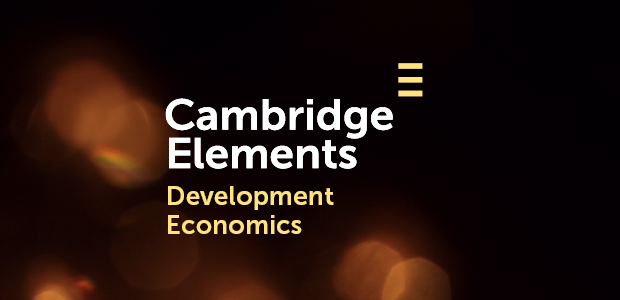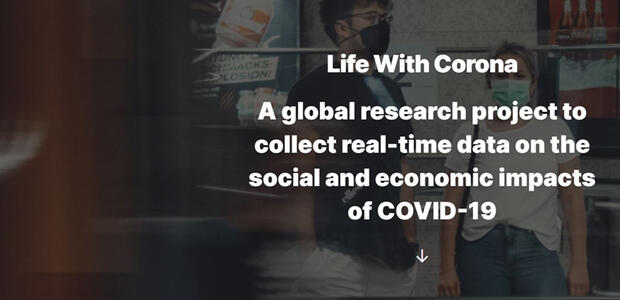Background Note
COVID-19 and socioeconomic impact in Asia
Several countries have enacted lockdown measures in the wake of the COVID-19 pandemic to protect their health systems and reduce the number of mortalities. One of the most extreme national lockdown measures has been taken by the government of India...
Blog
How Africa can fight the pandemic

by
Arkebe Oqubay
April 2020
The response to Africa’s COVID-19 plight must be swift and at scale rather than too little, too late. In a world short of progressive global...
Background Note
COVID-19 and socioeconomic impact in Africa
The COVID-19 pandemic has now spread to over 180 countries, including several countries in sub-Saharan Africa.1 Kenya reported its first COVID-19 case on 13 March 2020. By 31 March the number of confirmed cases had risen to 59, with over 70 per cent...
Working Paper
An assessment of the effects of COVID-19 pandemic on Kenya’s trade
We examine the impact of the COVID-19 pandemic on Kenya’s foreign trade using quarterly trade data for the period 2019 to the second quarter of 2021. The exploratory analysis shows that growth of Kenya’s merchandise exports remained resilient...
Journal Article
The impact of the COVID-19 pandemic on the poor
We examine the impact of the COVID-19 pandemic on the livelihoods of the poor in a semi-rural setting in Bangladesh. We use an unusually rich dataset which tracks the economic and financial transactions of sixty poor and very poor individuals and...
Working Paper
The impact of the COVID-19 pandemic on the poor
In this paper, we examine the economic impact of the COVID-19 pandemic on the livelihoods of the poor. We use an unusually rich data set from a ‘financial diaries’ study known as the Hrishipara Daily Diaries Project. The data set tracks the economic...
Working Paper
The role of trust and of poverty in compliance with social distancing measures in Africa during the COVID-19 pandemic
Since it began, the COVID-19 pandemic has imposed a number of challenges on Africa and the rest of the world. Following the recommendations of the World Health Organization, many countries imposed social distancing measures and cancelled non...
Working Paper
Forecasting recovery from COVID-19 using financial data
We develop a new methodology to nowcast the effects of the COVID-19 crisis and forecast its evolution in small, export-oriented countries. To this aim, we exploit variation in financial indexes at the industry level and relate them to the expected...
Blog
Why countries best placed to handle the pandemic appear to have fared the worst
by
Rachel M. Gisselquist, Andrea Vaccaro
June 2021
During the first year of the pandemic, it was wealthier countries, with their comparatively stronger health systems, civil services, legal systems and...
Working Paper
Analysis of the distributional effects of COVID-19 and state-led remedial measures in South Africa
This paper explores the impact of the first wave of the COVID-19 pandemic in South Africa on income poverty and inequality in South Africa. Using a static tax–benefit microsimulation model with input datasets that were adjusted to reflect people’s...
Working Paper
COVID-19 and the state
We expect effective state institutions to matter in a country’s ability to respond to crises. Yet notably in the first year of the COVID-19 pandemic, what has stood out in simple global snapshots is that wealthier countries with stronger institutions...
Working Paper
Pandemics and their impact on oil and metal prices
We examine the effect of pandemics on selected commodity prices—in particular, those of zinc, copper, lead, and oil. We set up a vector autoregressive model and analyse data since the mid-nineteenth century to determine how prices reacted to...
Blog
Helping the poor to survive lockdown
by
Risto Rönkkö, Stuart Rutherford,
Kunal Sen
August 2021
The Hrishipara Daily Diaries Project has been tracking the daily spending of 60 poor households in rural Bangladesh for the last six years. Analysis...
Working Paper
Trust in the time of corona
The global spread of COVID-19 is one of the largest threats to people and governments since the Second World War. The on-going pandemic and its countermeasures have led to varying physical, psychological, and emotional experiences, shaping not just...
Blog
Poverty and the pandemic in the Pacific

by
Christopher Hoy
June 2020
COVID-19 has had a far greater economic impact than health impact on Papua New Guinea (PNG) and the Pacific. There has been extensive commentary about...
Working Paper
The Great Influenza Pandemic of 1918–20
The Great Influenza Pandemic of 1918-20—commonly known as the Spanish flu—infected over a quarter of the world’s population and killed over 50 million people. It is by far the greatest humanitarian disaster caused by infectious disease in modern...
Journal Article
Life with Corona
Gender differences (GD) in mental health have come under renewed scrutiny during the COVID-19 pandemic. While rapidly emerging evidence indicates a deterioration of mental health in general, it remains unknown whether the pandemic will have an impact...
Working Paper
Does an effective government lower COVID-19’s health impact?
Government effectiveness has played an important role in tackling the crisis caused by the coronavirus (COVID-19) pandemic. This paper discusses the different aspects of government effectiveness in explaining the variation in the COVID-19 confirmed...
Working Paper
Duterte’s pandemic populism
The outbreak of the COVID-19 pandemic undermined the populist legacy of Philippine president Rodrigo R. Duterte. Despite implementing one of the longest and strictest lockdowns globally, the country has struggled with controlling the pandemic. While...
Working Paper
The COVID-19 pandemic and the state in Bihar
This paper presents a critical analysis of official data related to COVID-19 in Bihar state, India, which points to the manipulation of data for political ends. The ruling party’s claim that the state managed the COVID pandemic brilliantly seems more...
Working Paper
Pandemic precarity and the complicated case of Maharashtra
The state of Maharashtra and the city of Mumbai have been referred to as the epidemic epicentre of India since the time of the plague of 1896 and influenza epidemic of 1918. During the COVID-19 pandemic too, the state experienced the highest cases...
Journal Article
Analysis of the distributional effects of COVID-19 and state-led remedial measures in South Africa
This study explores the impact of the first wave of the COVID-19 pandemic in South Africa on income poverty and inequality in South Africa. Using a static tax-benefit microsimulation model with input datasets that were adjusted to reflect people’s...
Journal Article
COVID-19 and the state
During the first year of the COVID-19 pandemic, it was wealthier countries with stronger institutions that suffered the highest numbers of cases and fatalities. Many weaker countries were instead praised for more effective pandemic response. What...
Blog
The 1918-20 influenza pandemic: A retrospective in the time of COVID-19
by
Prema-chandra Athukorala, Chaturica Athukorala
November 2022
The influenza pandemic of 1918 (the Spanish Flu) is by far the greatest humanitarian disaster caused by an infectious disease in modern history. It...
Working Paper
Peruvian response to COVID-19 pandemic
Why does a state like Peru, dedicated to fulfilling development goals and sustained good macroeconomic performance, appear incapable of dealing with the COVID-19 pandemic? Using the case of maternal mortality, this paper argues that the tremendous...
Working Paper
Social distress and (some) relief
Up-to-date, nationally representative household income/expenditure data are crucial to estimating poverty during the COVID-19 pandemic and to policy-making more broadly, but South Africa lacks such data. We present new pandemic poverty estimates...
Working Paper
Physical proximity and occupational employment change by gender during the COVID-19 pandemic
Previous economic downturns such as the 2008–09 Global Financial Crisis disproportionately affected male employment due to greater contractions in industries typically filled by men (e.g., manufacturing). However, after the imposition of the ‘hard’...
Working Paper
The pandemic and the state
COVID-19 has brought to the fore the issue of state preparedness in mitigating health emergencies. This paper problematizes the received wisdom of greater state capacity in mitigating the severity of the pandemic. Based on a case study of West Bengal...
Working Paper
Corruption and crisis: do institutions matter?
While the short-term effects of the COVID-19 pandemic on lives and livelihoods are well understood, we know little about the effect of the pandemic for longer-term outcomes such as corruption. We look at the historical data on political and economic...
Working Paper
Management of the COVID-19 pandemic in Kerala through the lens of state capacity and clientelism
During the first wave of COVID-19 infections, Kerala, a state in southern India, successfully managed to contain the pandemic. As a result, the Kerala model of managing the COVID-19 pandemic was celebrated as a success across the globe. However, at...
Working Paper
The global inequality boomerang
This paper focuses on the past and potential future evolution of income (or consumption) inequality in the world over the period 1981–2040. Inequality in the world has fallen by most common definitions since the late 1980s, and this is largely due to...
Working Paper
Social protection expansions during crisis and fiscal space
This study provides a first attempt to contribute a large-scale assessment of whether crisis response as observed during the COVID-19 pandemic can serve as a feasible blueprint for creating durable solutions across countries. Adopting a lens on...
Working Paper
Institutional trust in the time of corona
We study how the stringency of policy measures to counter the COVID-19 pandemic affects individuals’ trust in formal institutions. Drawing on micro-level panel data from Germany spanning an 18-month period from the onset of the pandemic, we show that...
Working Paper
How should an optimal tax system react to a crisis?
The COVID-19 pandemic increased public debt and changed the income distribution in many countries. We use a numerical simulation approach to derive optimal nonlinear marginal tax rates for the pre-crisis and crisis periods. We contribute to the...
Journal Article
Is the era of declining global income inequality over?
This study examines the trajectory of global income inequality since 1981. Commonly used (relative) definitions indicate a decline in global inequality since the late 1980s. Looking ahead, it has been intuited that the influence of China's economic...
Journal Article
Do economic and political crises lead to corruption? The role of institutions
A large body of literature exists on the role of institutions in combating corruption and its influence on economic development. However, there is a paucity of literature on the inter-relationships between economic and political crises, institutions...

 Join the network
Join the network







